Congress is returning to Washington for a brief lame-duck session, with several major issues to deal with — particularly a new Covid-19 stimulus package for millions of Americans struggling to get by while coronavirus infections soar.
“Covid-19 relief, a $1.4 trillion catchall spending package, and defense policy — and a final burst of judicial nominees — [will] dominate a truncated two- or three-week session,” reports the Associated Press.
But bitter partisan division over the size and nature of any Covid relief bill could prevent passage of anything to address the pandemic in the short time lawmakers have before adjourning again on Dec. 21.
One bipartisan group of senators is trying to beat those odds, reports Axios.
In what could be “the most significant bipartisan step toward Covid relief in months,” the website says, “at least nine” Senate Democrats and Republicans “have formed an informal working group aimed at securing new coronavirus spending during the lame-duck session, a move favored by President-elect Biden,” Axios says, citing “two sources familiar with the group.”
Currently, national government assistance to those left jobless by the pandemic ranges from 100% for small-business workers in Japan to 75% in Canada.
But in the United States, so long as Congress fails to act, that figure is zero.
“Republicans and Democrats have for months been deadlocked over a new coronavirus relief bill, despite pressure from President Donald Trump and President-elect Joe Biden to cut a deal,” says Business Insider.
If Congress does manage to pass a package that includes stimulus checks by Dec. 21 when the Senate adjourns for the year, “there’s likely enough time for people to receive a payment by Dec. 31,” Newsweek reports.
But that looks unlikely — and Americans most in need of help are paying the price.
Families from coast to coast are growing desperate for a new round of federal help as unemployment continues to rise and the economic recovery falters.
Michael Alves of Baytown TX is one all-too-typical case, reports the Houston Chronicle.
Alves lost his job last April, but managed to get along — paying rent. car payments and grocery bills — with vital help from the federal pandemic assistance program that provided an extra $600 per week in unemployment benefits.
But at the end of July, that relief program ran out; ever since, Congress has done nothing but argue over a replacement package and Alves has no idea how to pay his bills, including medications for his ailing wife.
“We’re going to be homeless, basically, if we don’t get some help,” Alves told the Chronicle.
With so many of their constituents facing similar crises, and Congress seemingly unable to act, state and local officials are under enormous pressure to do something.
Michigan Gov. Gretchen Whitmer, a Democrat, is asking the Republican-led state legislature to pass a $100 million Covid relieve plan, reports.
Whitmer sent a letter to legislators last week, pleading for them to approve “direct financial support to the families and small businesses that have been hit hardest by the pandemic.” There isn’t much time: the Michigan legislature returns on Tuesday, but the session will last only until Dec. 17, the Detroit Free Press reports.
“Michigan families are hurting, and while we must continue to advocate for meaningful support from the federal government, we simply cannot afford to wait,” Witmer wrote in Wednesday’s letter.



